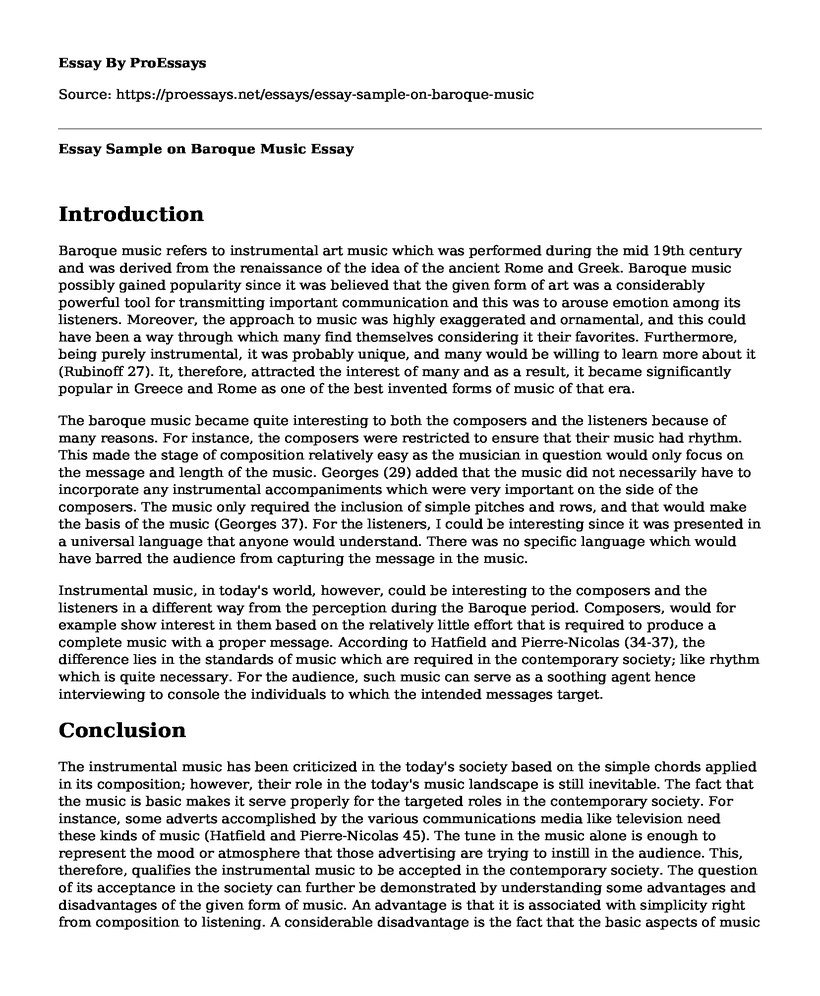Introduction
Baroque music refers to instrumental art music which was performed during the mid 19th century and was derived from the renaissance of the idea of the ancient Rome and Greek. Baroque music possibly gained popularity since it was believed that the given form of art was a considerably powerful tool for transmitting important communication and this was to arouse emotion among its listeners. Moreover, the approach to music was highly exaggerated and ornamental, and this could have been a way through which many find themselves considering it their favorites. Furthermore, being purely instrumental, it was probably unique, and many would be willing to learn more about it (Rubinoff 27). It, therefore, attracted the interest of many and as a result, it became significantly popular in Greece and Rome as one of the best invented forms of music of that era.
The baroque music became quite interesting to both the composers and the listeners because of many reasons. For instance, the composers were restricted to ensure that their music had rhythm. This made the stage of composition relatively easy as the musician in question would only focus on the message and length of the music. Georges (29) added that the music did not necessarily have to incorporate any instrumental accompaniments which were very important on the side of the composers. The music only required the inclusion of simple pitches and rows, and that would make the basis of the music (Georges 37). For the listeners, I could be interesting since it was presented in a universal language that anyone would understand. There was no specific language which would have barred the audience from capturing the message in the music.
Instrumental music, in today's world, however, could be interesting to the composers and the listeners in a different way from the perception during the Baroque period. Composers, would for example show interest in them based on the relatively little effort that is required to produce a complete music with a proper message. According to Hatfield and Pierre-Nicolas (34-37), the difference lies in the standards of music which are required in the contemporary society; like rhythm which is quite necessary. For the audience, such music can serve as a soothing agent hence interviewing to console the individuals to which the intended messages target.
Conclusion
The instrumental music has been criticized in the today's society based on the simple chords applied in its composition; however, their role in the today's music landscape is still inevitable. The fact that the music is basic makes it serve properly for the targeted roles in the contemporary society. For instance, some adverts accomplished by the various communications media like television need these kinds of music (Hatfield and Pierre-Nicolas 45). The tune in the music alone is enough to represent the mood or atmosphere that those advertising are trying to instill in the audience. This, therefore, qualifies the instrumental music to be accepted in the contemporary society. The question of its acceptance in the society can further be demonstrated by understanding some advantages and disadvantages of the given form of music. An advantage is that it is associated with simplicity right from composition to listening. A considerable disadvantage is the fact that the basic aspects of music are not balanced; bass could be too thin.
Works Cited
Abolhasani, Morteza, Steve Oakes, and Helen Oakes. "Music In Advertising And Consumer Identity." Marketing Theory 17.4 (2017): 473-490. Web. 23 Sept. 2018.
Hatfield, Johannes L., and Pierre-Nicolas Lemyre. "Foundations Of Intervention Research In Instrumental Practice." Frontiers in Psychology 6 (2016): n. pag. Web. 23 Sept. 2018.
Georges, Patrick. "Western Classical Music Development: A Statistical Analysis Of Composers Similarity, Differentiation And Evolution." Scientometrics 112.1 (2017): 21-53. Web. 23 Sept. 2018.
Rubinoff, K. R. "'The Grand Guru Of Baroque Music': Leonhardt's Antiquarianism In The Progressivist 1960S." Early Music 42.1 (2014): 23-35. Web. 23 Sept. 2018.
Cite this page
Essay Sample on Baroque Music. (2022, Aug 10). Retrieved from https://proessays.net/essays/essay-sample-on-baroque-music
If you are the original author of this essay and no longer wish to have it published on the ProEssays website, please click below to request its removal:
- History of Queen Elizabeth Park Essay Example
- The Magazine Cover for Teen Vogue Essay
- French Movies vs American Movies - Essay Sample
- The Use of Symbolism in the Novel "When the Emperor Was Divine"
- Paper Example on Public Speaking: Improving My Social & Persuasive Skills
- Office Space: Frustrated Employees in the Workplace - Essay Sample
- Riders to the Sea Movie Review Script Analysis







